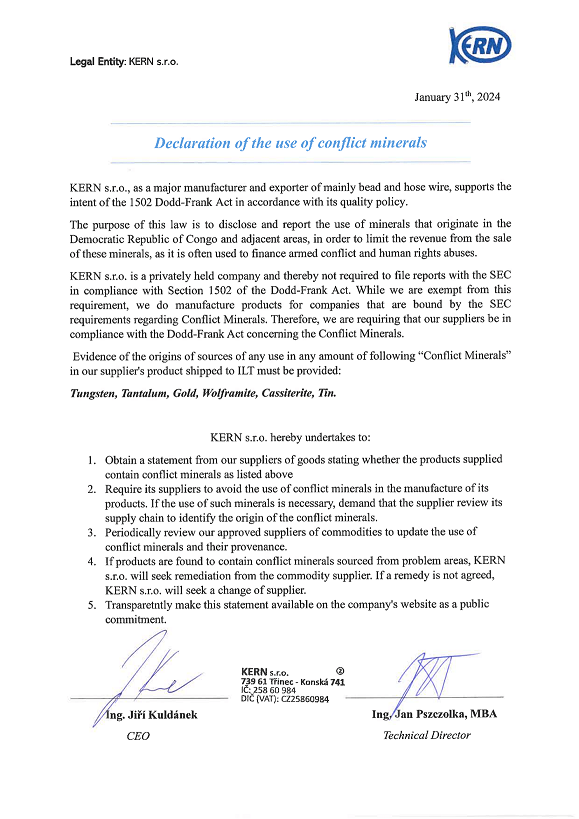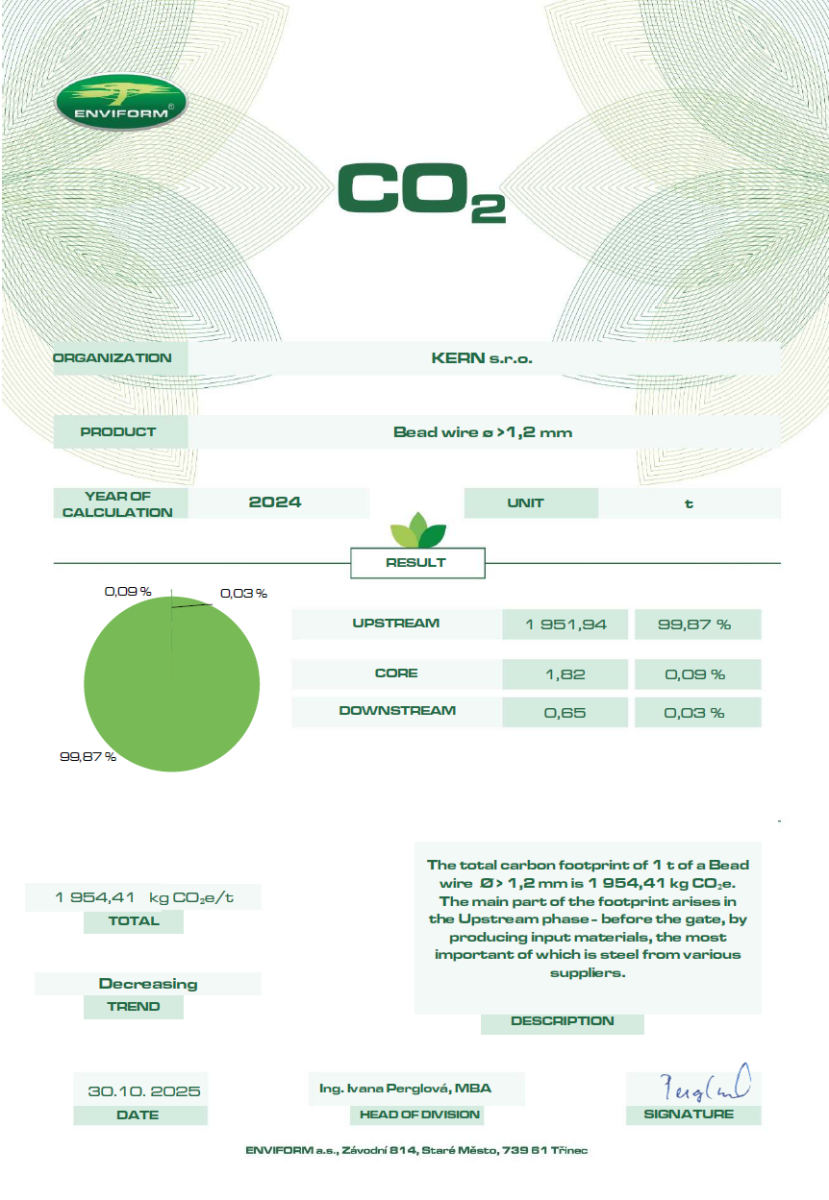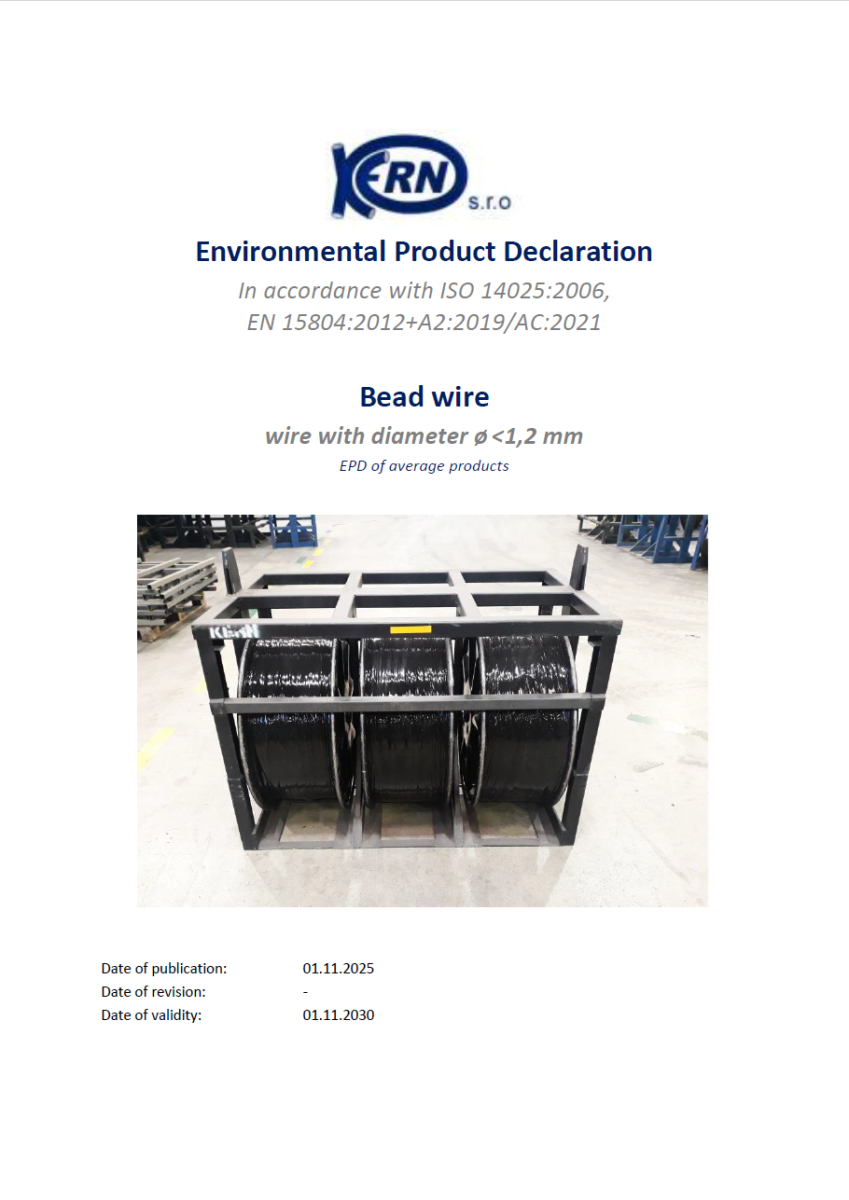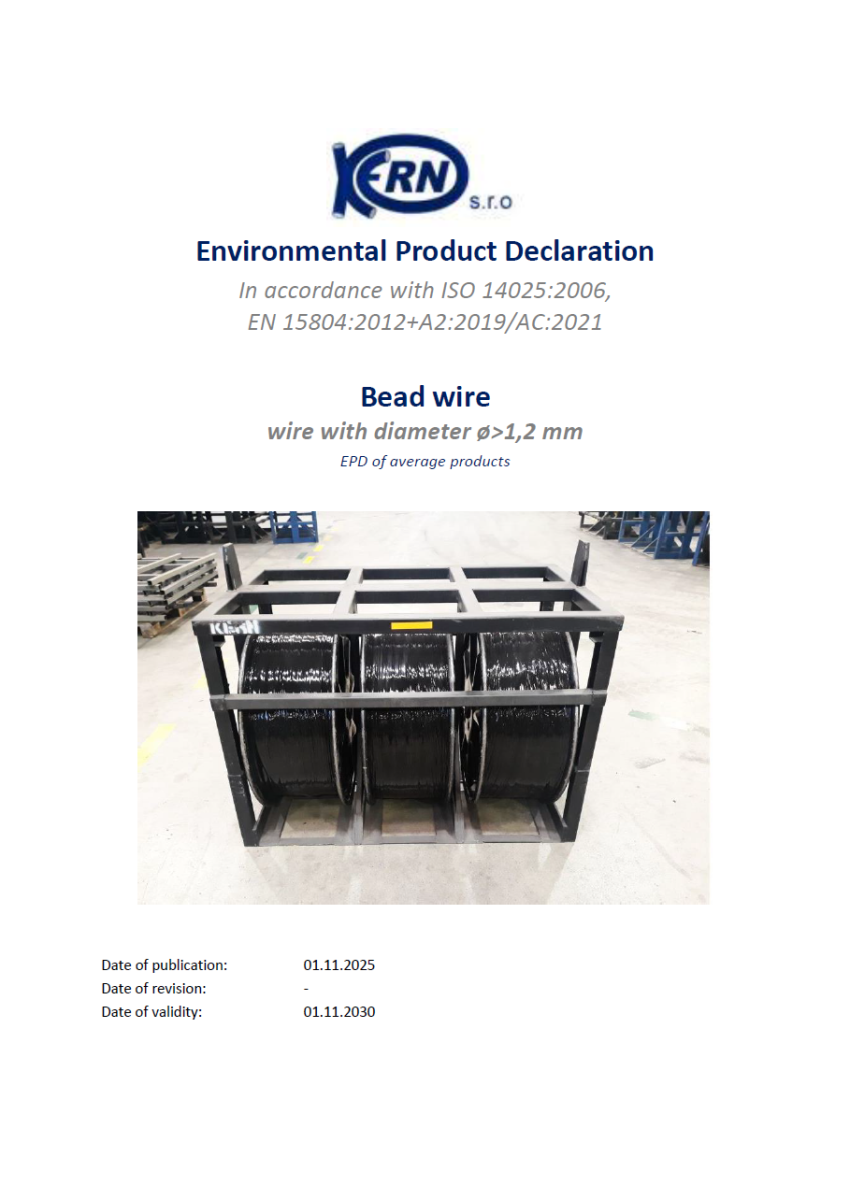Sustainability
Sustainability Initiative
Who do we want to be?
A reliable supplier of high-quality, sustainably produced beadwire.
How do we want to achieve a sustainable product?
By understanding the issues of sustainability, identifying our opportunities and weaknesses, and subsequently implementing appropriate measures.
Driving forces of Sustainability at KERN:
- Awareness and responsibility of owners and company management
- Awareness and responsibility of employees
- Efforts to make a positive impact on the local community
- Requirements of the modern market environment
- EU and Czech legislation
ESG - Environmental, Social and Corporate Governance
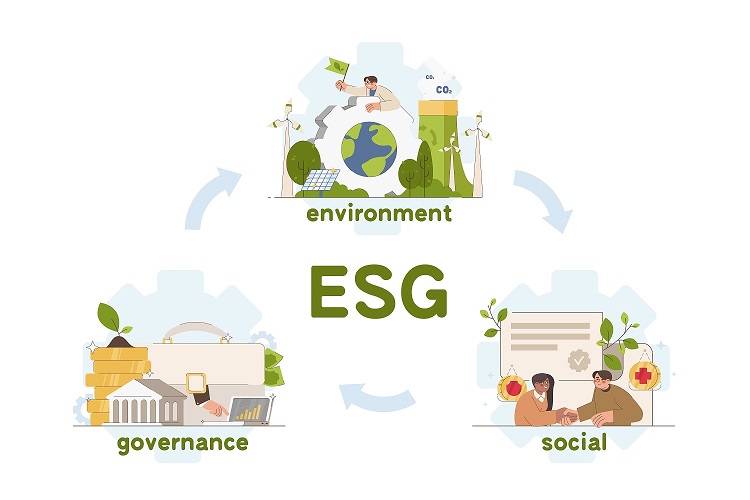
Our Contributions - Environment:
- The environmental management system according to ISO 14001 has been implemented and improved since 2002
- Water management in accordance with applicable laws and regulations
- Modernization of the neutralization station to increase the purity of wastewater
- Upgrade of cooling towers with higher efficiency in the use of cooling water
- Development and use of induction heating for wire heat treatment instead of lead bath heating
- Providing Reach declarations and other statements on the non-use of highly toxic and harmful substances
- Providing a safety data sheet for the manufactured beadwire
- Carbon footprint determination retrospectively since 2018
- Registered on the CDP portal since 2017, current rating – “C”
- Transformation of the company fleet - replacement of diesel cars with hybrid and petrol cars with lower consumption
- Inclusion of solar energy in the newly prepared project for the construction of a production hall in Český Těšín
- Monitoring and activities in the field of circularity, especially the content of recycled material in the used wire rod
Our Contributions - Social:
Company management fully promotes the principles of equality in opportunities and relationships at all levels of management and workplaces. As a company with a small number of employees, we do not have unions, but all workers have the opportunity to express their demands and opinions on company matters.
The occupational health and safety management system according to OHSAS 18001 and subsequently ISO 45001 has been implemented and improved since 2016. Employees receive contributions for meals, health prevention, and recreation, as well as for savings products – pension insurance and life insurance.
The company cooperates with contributory organizations (e.g., Chráněná dílna PUNTIK). We are gradually changing or modifying production equipment to increase work safety and improve the working environment:
- Modernization of beadwire lines
- Replacement of older wire drawing lines with new, modern drawing machines with lower noise and dust levels
- Installation of modern pre-treatment to older wire drawing lines to reduce process noise
- Installation of Herding dust extraction systems
- Installation of a closed cumarone unit for the extraction and disposal of toxic and volatile substances
Our company emphasizes regular preventive check-ups for all employees and thorough monitoring of the working environment to ensure all legal limits are met. We have zero tolerance for workplace injuries and child labor. At the same time, we take full responsibility towards our customers and their requirements are transmitted throughout the entire supply chain.
Our Contributions - Governance:
Our market and societal behavior is declared in our Code of Conduct, which is also applied to our suppliers. We comply with all laws required by the legislation of the Czech Republic and the European Union and act transparently towards government authorities, including tax declarations in the country of business. Since 2019, our sustainability has been evaluated and made accessible to our customers in the ECOVADIS system, where we currently hold a silver medal.
Eko-Kom system:
KERN s.r.o. has been registered with the EKO-KOM system since 2021. This step is a testament to our commitment to environmental protection and sustainability. EKO-KOM is an authorized packaging company established in 1997, and since then, it has been effectively operating a nationwide system for sorting, recycling, and utilizing packaging waste.
By participating in the EKO-KOM system, we contribute to ensuring that waste from our packaging is properly sorted, recycled, and used as secondary raw material or energy source. This system is based on the cooperation of industrial enterprises, cities, and municipalities, ensuring a high recycling rate and efficient waste utilization.
Our involvement in the EKO-KOM system brings significant environmental benefits. We help reduce the amount of waste ending up in landfills and support material recycling, which conserves natural resources and reduces greenhouse gas emissions. In this way, we contribute to environmental protection and sustainable development. We are pleased that our company, KERN s.r.o., is part of this system and that we can actively contribute to a better future for all of us.
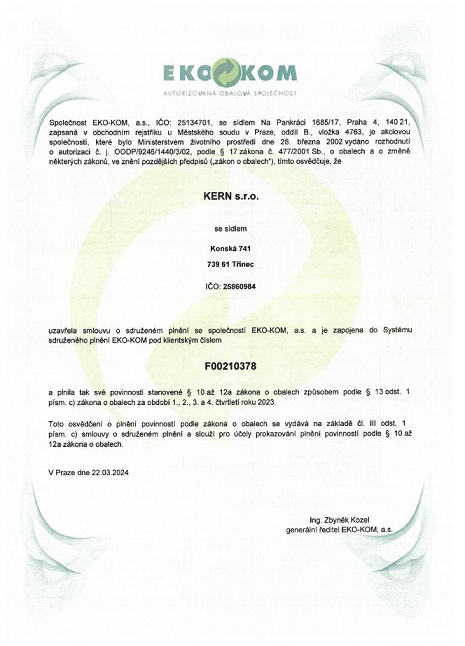
Roadmaps for Carbon Footprint and Recycled Steel Content
The 2015 Paris Agreement, under the United Nations Framework Convention on Climate Change (UNFCCC), set a goal to keep the increase in global average temperature well below 2°C above pre-industrial levels. Additionally, at the 2021 UNFCCC conference, it was recognized that limiting the temperature rise to 1.5°C would significantly reduce the risks and impacts of climate change, leading to further commitments. In line with these global targets, Kern has developed its own strategy to reduce greenhouse gas emissions, specifically CO2.
Our primary focus for decarbonization is on reducing Scope 3 emissions, which account for more than 95% of our relative carbon footprint (tons of CO2 per ton of product). Purchased steel (rolled wire and semi-finished products) significantly influences this share, constituting approximately 85% of our product’s carbon footprint. According to available sources from our rolled wire suppliers, steel produced in blast oxygen furnaces (BOF) is highly polluting, with an average carbon footprint of 2.1 t CO2/t of steel. These processes use only about 18% - 25% recycled material (scrap).
The second method of steel production available today is through electric arc furnaces (EAF), which use about 95% scrap. This method is much more environmentally friendly, with a carbon footprint of approximately 0.9 t CO2/t of steel. Increasing the share of inputs from available sources—rolled wire and semi-finished products based on EAF steel—will significantly impact our product’s carbon footprint and contribute to greater circularity.
We will also reduce our carbon footprint through a sustainable approach to purchasing other raw materials and energy. While the impact of these steps may not be as significant (currently estimated at 0.2 t CO2/t), they will still contribute to our ultimate goal of achieving carbon neutrality.
Timeline:
2023
Establishment of the carbon footprint based on historical data starting from the reference year 2018.
Carbon footprint: 2,51 t CO2/t.
2024-2026
Increase the share of purchased steel from EAF from 5% to 25%.
Construction of a warehouse necessary to further increase the share of purchased steel from EAF from 25% to 50%.
Carbon footprint: 2,22 t CO2/t.
2027-2031
Increase in the share of purchased steel from EAF from 25% to 50%.
Carbon footprint: 1,87 t CO2/t.
From 2032 onwards
Increase in the share of purchased steel from transformed steel mills of current major suppliers of wire rod and semi-finished products up to 100%.
Carbon footprint: 1,09 t CO2/t
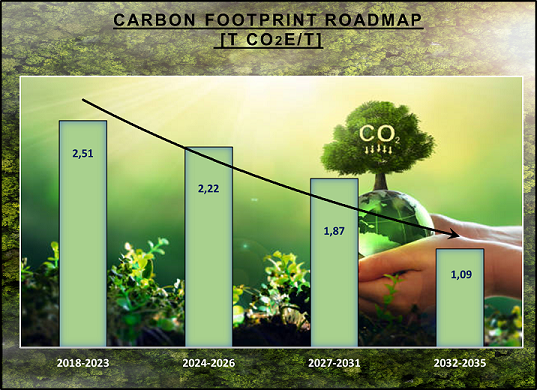
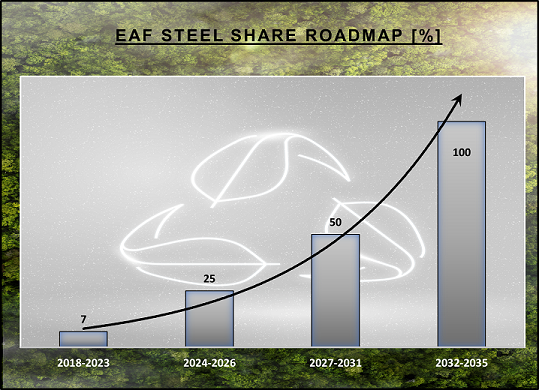
Throughout the duration of this process, relationships with new and transformed steel sources will continue to be actively developed. Carbon footprint calculations will be carried out, and input data and its calculations will be refined. This will be achieved especially after the completion of the current project to implement ERP in our company and the availability of certified data for Scope 1 and 2 for imported steel, as mandated by the EU CBAM directive from 2026.
Certificates:
CO2 Certificate
EPD (environmental product declaration)
CDP Score Report
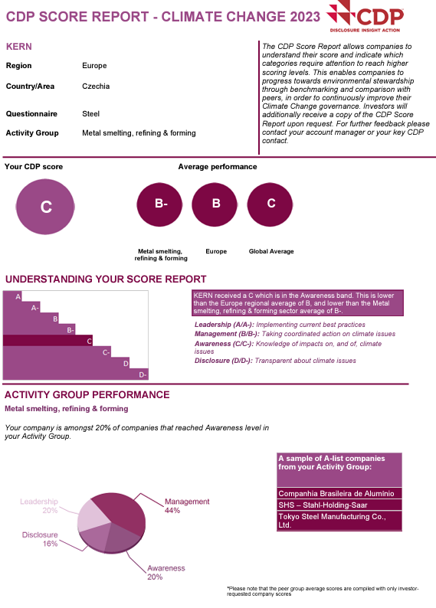
EcoVadis Scorecard
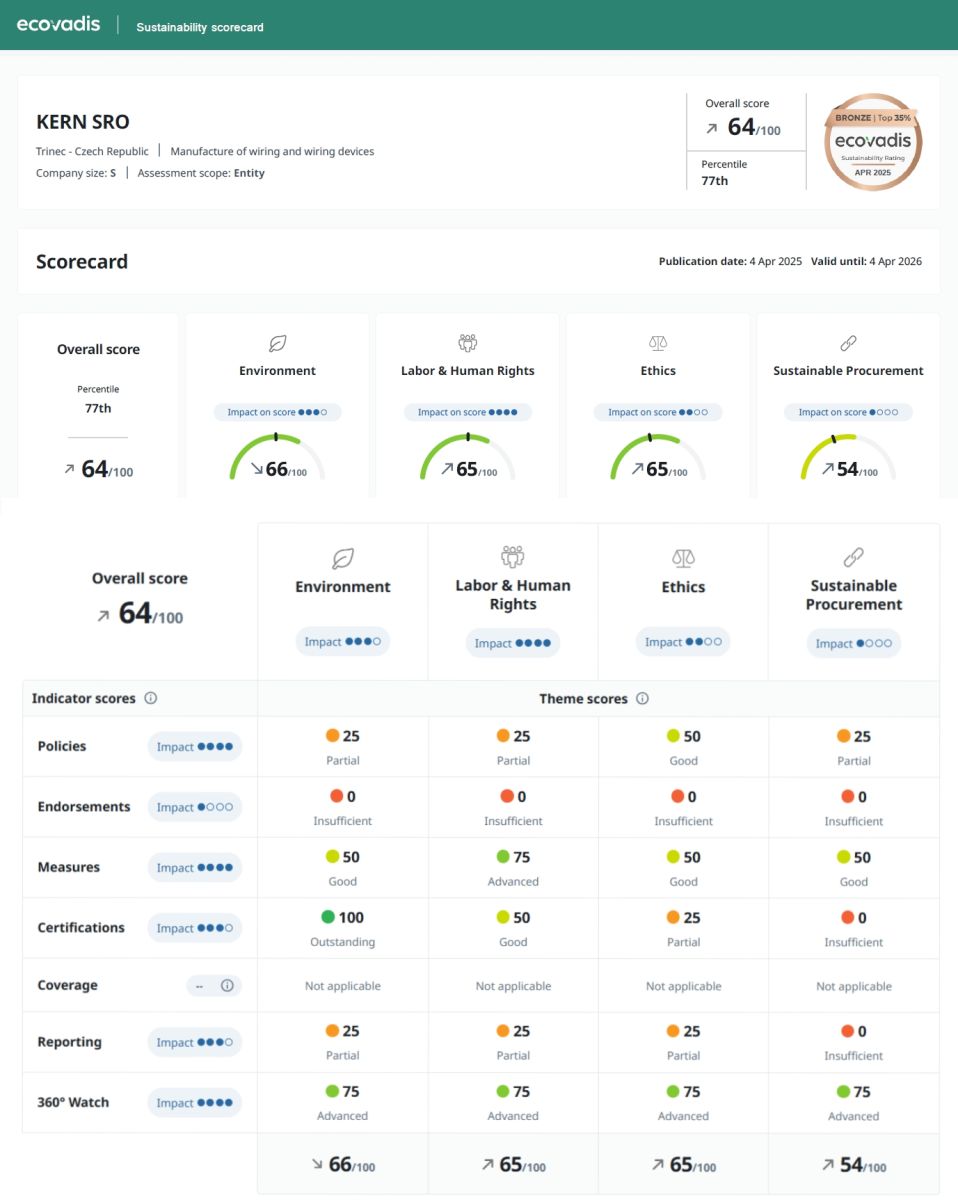
Binding Declarations:
Declaration of RoHS
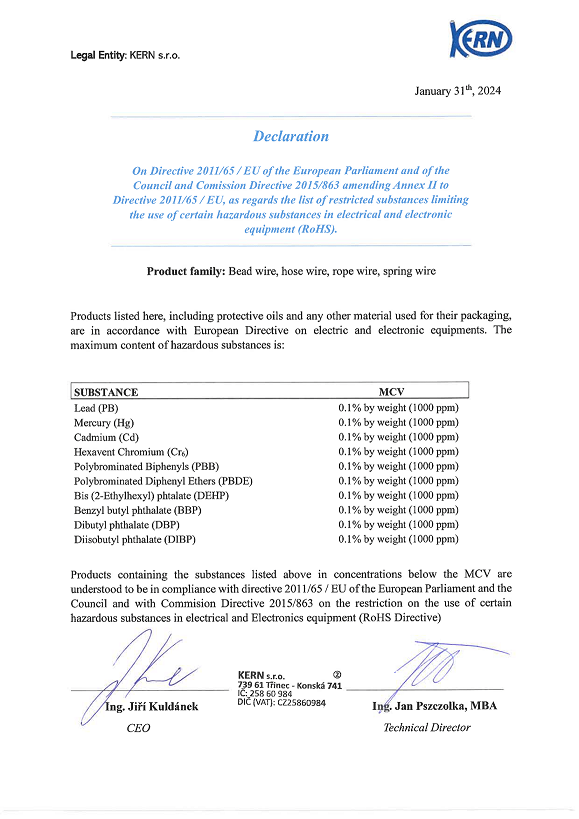
Directive Information on the Presence of Substances from the REACH Candidate List - Substances of Very High Concern (SVHC)
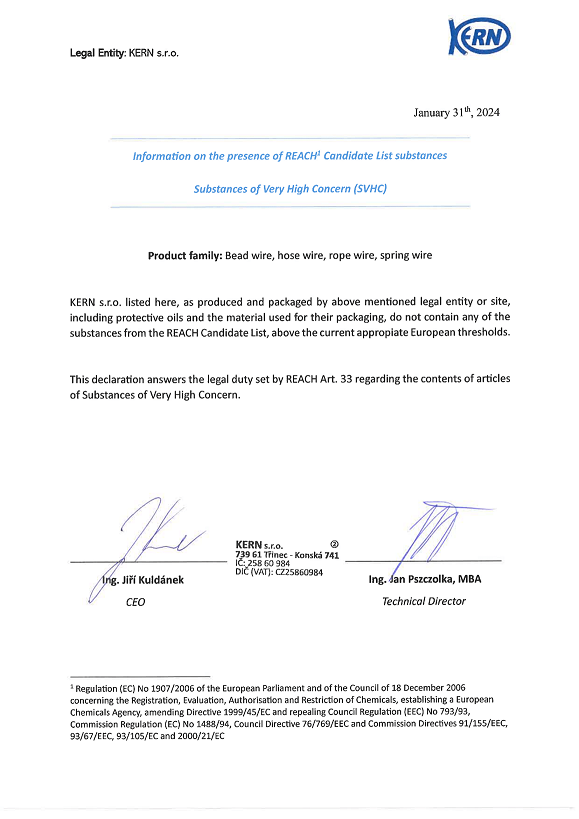
Declaration on Regulation (EU) 2019/1021 of the European Parliament and of the Council of 20 June 2019 on Persistent Organic Pollutants (POPs)
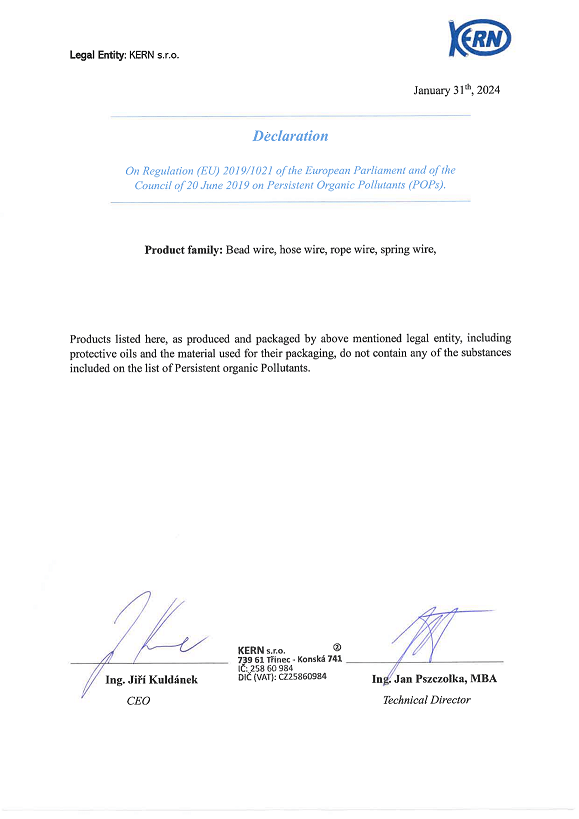
Declaration on the Use of Conflict Minerals
